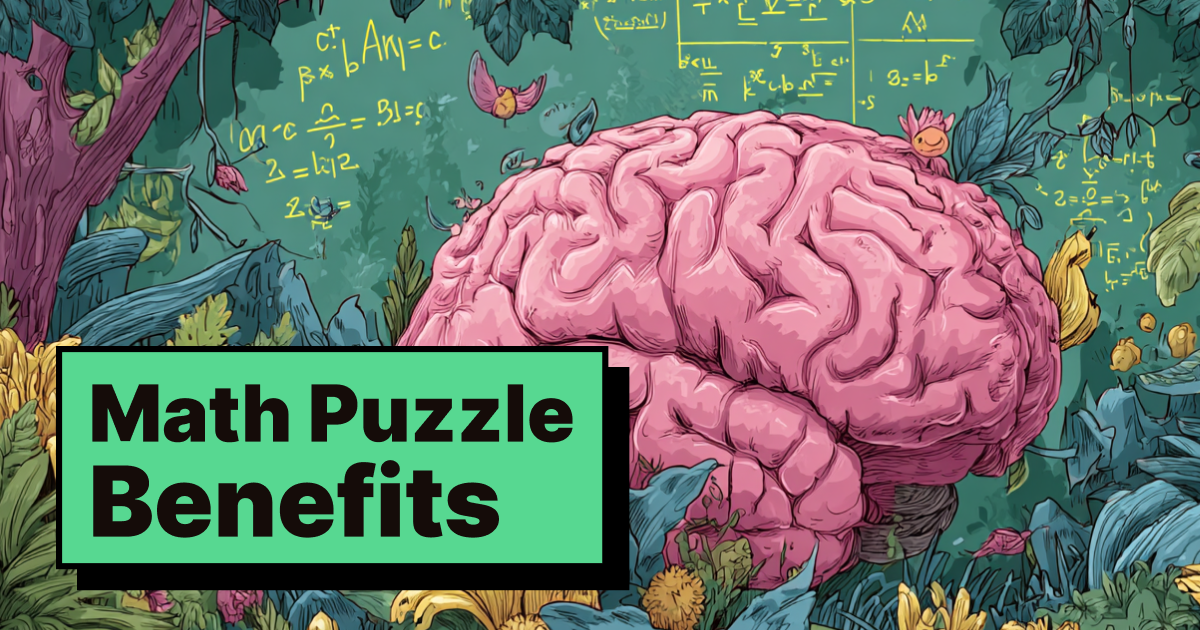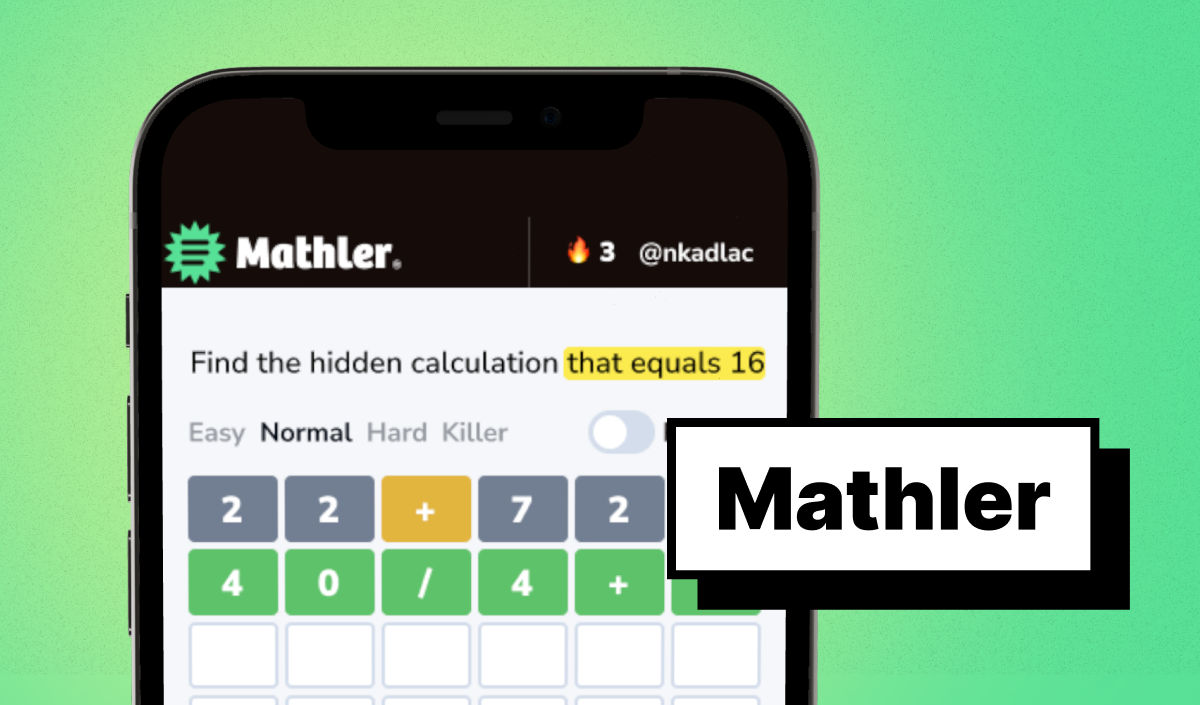Benefits of Math Puzzles: Brain Gains for Students & Adults

Math puzzles offer more than just challenging entertainment—they can also significantly help with your brain's capabilities! You'd be very surprised to learn the many benefits of playing number-based puzzle games, and Mathler is a "math Wordle" that is more accessible to a lot of players who want the experience of solving puzzles while also learning something.
Continue reading to know how math puzzles can help improve the mind's number sense, mental arithmetic speed, attention span, overall memory and more!
What counts as a “math puzzle”?
Math puzzles are, by name, problems or recreational games that primarily rely on mathematical reasoning and logical processes to solve. To make it easier to remember, here are some (not all) of the criteria needed to define a game as a math puzzle:
✅ Follows a fixed logic or reasoning
✅ Has a set of rules that define gameplay
✅ Has a mathematical concept driving it (counting, operations, etc.)
✅ Is primarily for recreation or fun
Common types of math puzzles

Many games fall into this subgenre, and their difficulty, approachability and playtimes all vary. To give you an idea, here are some of the more common types of math puzzles available right now:
- Equation games - revolve around forming or completing equations, like Mathler and Nerdle.
- Clue grids - grid puzzles that use clues or given to drive gameplay, like Kakuro and Sumplete.
- Operation cages - games that use cages with operations like addition or division as constraints for solving, like KenKen and Killer Sudoku.
- Mental-math sprints - recreational exercises that focus on mental math skills, like 24 Game and MathHeads.
- Logic-number puzzles - puzzles that focus more on counting and logic, like Hitori and Crossmath®.
Benefits of solving puzzles
What better way to have fun than to play games that actually help with your productivity and problem-solving skills? Not everyone can be a math genius, but a math genius can be anyone, and math is a formal science that rewards effort and constant use.
There are many different benefits of solving puzzles in general, and math puzzles, in particular, offer particular advantages, including (but not limited to):
Better basic math skills
The most upfront pro of playing math puzzles is that it makes the player become better at handling their basic math skills. Yes, it's one thing to know what to do, and it's a whole other thing to put it into practice. Playing math puzzles continuously not only puts the theory into practice but also drills the mind into following certain patterns when specific triggers are present.
For example, a construction worker who lost the receipt for their materials but knows the prices of each item they bought can easily divide, add and subtract in their mind because they play Mathler every day. Or a cashier who can already add up all the items in their mind before they even scan the items because they play MathHeads daily.
Improved number sense and mental arithmetic
Math puzzles make players deal with numbers and concepts that revolve around them, like counting, operations and expressions. Continuous play hones a certain intuition that sets apart the number sense and mental arithmetic skills of someone who regularly solves math puzzles from those of a normal person.
A study has also shown that children who played number-line games (even before they're able to fully speak) become more comfortable with numbers and grow to have better arithmetic skills.
Faster memory recall and longer attention span
Playing things like math puzzles requires a good memory (like which numbers are what and the exact order of operations), especially when equations are involved. Solving puzzles daily makes the memory snappier and pattern recognition is also quickened.
If you're faced with a tricky puzzle, your attention span needs to hang longer and stronger for you to be able to pick up details that will help you solve it. That's why a lot of math puzzle players can often stare and analyze a complex puzzle sheet for long periods of time.
There's also been research involving developing children and math board games, and how they had better overall memory and attention to detail.
Improved problem-solving skills and critical thinking
Puzzles are, at their core, just recreational problems that are meant to challenge and entertain at the same time. If you solved the same family of problems every day, even if there are minor or major deviations, the experience you've accumulated will help you create an internal plan that will eventually solve any problem.
It's like creating an ever-evolving checklist, "Does this work? If so, then the next step should be..." This certainly applies to math and math puzzles as well!
Enhanced logical thinking
Math is, if not anything else, a system that is completely grounded in logic. It's so universally reliable that even if you put two people from opposite sides of the world in front of a basic math problem, they'd be able to show you the solution, even if everyone in the room can't speak the same language.
In that regard, puzzles that are math-based are also completely logical, and the more you solve and learn from them, the better your logical thinking will be. In fact, math teachers adopted KenKen for classroom use because it combined arithmetic and logical thinking.
Confidence in approaching math
Numbers and mathematical concepts appear intimidating, especially in a school setting. But this is one of the many reasons why so many learning institutions try to introduce math in a fun and approachable way, and why teachers have learned to implement math puzzles in their curricula.
If you showed someone a chalkboard filled with mathematical equations, they'd be instantly turned away. Math puzzles, on the other hand, are welcoming and interesting to those who look at them. This interest then turns into excitement, and excitement into joy. That joy ultimately paves the way to confidence that will continue to solidify with each solved puzzle.
Puzzle play in classrooms
One of the best places to play math puzzles is in a classroom, and for many good reasons:
- Students have fun and learn at the same time.
- Skills development becomes smoother to handle for teachers as interest in the subject grows.
- Helps gauge the individual skill levels of each student via speed of solving, depth of understanding and general results.
- Takes away the monotony of classes and provides a nice change of pace.
If you're interested in using a math puzzle to make learning mathematics more interesting for your class, check out this free Mathler e-book. We highly recommend printing copies and handing them out for class activities.
FAQ
Do math puzzles improve intelligence?
A common misconception. Math puzzles don't make someone smart—it's the skills they hone while playing that help them become intelligent. The puzzles sharpen things like problem-solving skills, attention span, reasoning, etc. And when these skills are sharper, it helps a person learn more easily and faster, which in turn makes them intelligent.
TL;DR: No. Math puzzles don't increase IQ directly. They help improve the chance of getting a higher IQ.
How long should I practice daily?
Three to ten minutes of playing with math concepts is more than enough for most people to keep their minds sharp, especially in the morning for early puzzle play.
Are puzzles good for math anxiety? (Low-stakes, short wins can help rebuild confidence.)
Definitely! If you're not confident with your math skills, try out the easiest difficulty puzzles first. Constant winning and incremental progression build a solid foundation of self-trust.
Which puzzles help most with mental math?
Mathler, KenKen and Nerdle are some of the best puzzles to try for improving mental math.
Do kids need prior skills?
It depends on the age of the child. If they're too young to understand basic directions and arithmetic, it is too early for them to try playing daily math games.
Can puzzles help adults who feel rusty?
100%. In fact, math puzzles like Mathler and Kakuro are ideal for adults and seniors to keep their minds sharp and avoid mental degradation. Aside from numerical games, there are a lot of other puzzles that help shake the rust off. Get logic benefits: Try Queens Ultimate!
Are there printables for classrooms?
Yes. Here's a link to our free e-book.
Play more brainy games and improve your spatial reasoning and more!
We hope that we were able to teach you some of the best benefits of playing math puzzles. If you enjoy playing brainy apps like Mathler and other challenging games, then check out our daily math Wordle puzzles and join our official Discord server today!